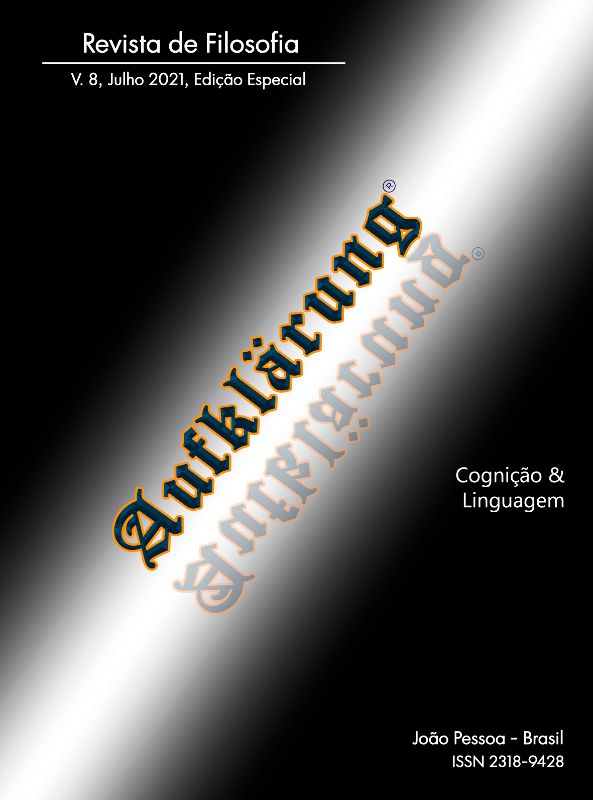The representational theory of mind and common sense psychology
DOI:
https://doi.org/10.18012/arf.v8iesp.60021Palavras-chave:
Mental representations, psychological explanations, behaviorism, WittgensteinResumo
The goal of this paper is to present some advantages of the representational and computational theories of mind when compared to other views, especially behaviorism. The idea is that representational and computational theories allow us to conceive propositional attitudes (mental states such as beliefs and desires) in a way that preserves two essential features we take them to have in common sense psychological explanations: semantic evaluability and causal efficacy. Behaviorism reconceives mental states in a way that doesn’t preserve these essential features. In so doing, it makes a mystery of the success of common sense psychology. I illustrate some of the difficulties that behaviorism faces by considering and criticizing Wittgenstein’s approach to linguistic understanding. The upshot is that representational and computational theories of mind do a better job at vindicating common sense psychology, and so are to be preferred when compared to behaviorism.
Downloads
Referências
AYDEDE, M. The Language of Thought Hypothesis, The Stanford Encyclopedia of Philosophy, E. N. Zalta_(ed.), Disponível em: https://plato.stanford.edu/archives/spr2019/entries/language-thought/, 2010.
BOONE, W.; PICCININI, G. The cognitive neuroscience revolution. Synthese 193:1509–1534, 2016.
CAIN, M. J. Fodor: Language, Mind and Philosophy. Cambridge: Polity Press, 2002.
CRANE, T. The mechanical mind: a philosophical introduction to minds, machines and mental representation (2nd edition). Taylor & Francis e-Library, 2003.
DEVITT, M. Ignorance of language. Oxford: Oxford University Press, 2006.
DAWES, A. J. et al A cognitive profile of multi-sensory imagery, memory and dreaming in aphantasia._Scientific Reports_10,_10022, 2020.
FODOR, J. A. The Language of Thought. Cambridge, MA: Harvard University Press, 1975.
FODOR, J. A. Methodological solipsism considered as a research strategy in cognitive psychology In: Representations: Philosophical Essays on the Foundations of Cognitive Science. Cambridge, MA: MIT Press Bradford Books, 1981a.
FODOR, J. A. The Mind-Body Problem. In: Scientific American. 244:114-25, 1981b.
FODOR, J. A. Psychosemantics: The Problem of Meaning in the Philosophy of Mind. Cambridge, MA: MIT Press Bradford Books, 1987.
FODOR, J. A. Theory of content and other essays. Cambridge, MA: MIT Press Bradford Books, 1990.
FODOR, J. A. In critical condition. Cambridge, MA: MIT Press Bradford Books, 1998.
FODOR, J. A. More peanuts. In: London Review of Books, Vol. 25, No. 19, pp. 16-17. 2003
HUTTO, D. D.; MYIN, E. Radicalizing enactivism. Cambridge, MA: MIT Press Bradford Books, 2013.
PLACE, U. T. Is consciousness a brain process? In: British journal of psychology, 47:1, pp. 44-50, 1956.
PUTNAM, H. Brains and behavior, in: Heil, J. (ed.) Philosophy of Mind: a guide and anthology. Oxford: Oxford University Press, 2004 (1963).
PUTNAM, H. Psychological Predicates, in: Heil, J. (ed.) Philosophy of Mind: a guide and anthology. Oxford: Oxford University Press, 2004 (1967).
QUILTY-DUNN, J; MANDELBAUM, E. Against dispositionalism: belief in cognitive science. Philosophical Studies, 175:2353–2372, 2018.
RYLE, G. The concept of mind. London: Penguin Books, 1990 (1949).
SEARLE, J. R. Minds, brains and programs. In: Behavioral and Brain Sciences 3 (3): 417-457, 1980.
SEARLE, J. R. Intentionality. Cambridge: Cambridge University Press, 1999 (1983).
STRAWSON, G. Consciousness isn’t a mystery. It’s matter. In: The New York Times, 2016.
WITTGENSTEIN, L. Philosophical investigations. Chichester: Wiley-Blackwell, 2009 (1953).
WITTGENSTEIN, L. The blue book. New York: Harper Torchbooks, 1965 (1958).
ZEMAN, A.; DEWAR, M.; DELLA SALA, S. Lives without imagery - Congenital aphantasia. Cortex 73, 378-380, 2015.
Arquivos adicionais
Publicado
Como Citar
Edição
Seção
Licença

Este trabalho está licenciado sob uma licença Creative Commons Attribution 4.0 International License.
Política de Direito Autoral para os itens publicados pela Revista:
1.Esta revista é regida por uma Licença da Creative Commons aplicada a revistas eletrônicas. Esta licença pode ser lida no link a seguir: Creative Commons Attribution 4.0 International (CC BY 4.0).
2.Consonante a essa politica, a revista declara que os autores são os detentores do copyright de seus artigos sem restrição, e podem depositar o pós-print de seus artigos em qualquer repositório ou site.
Política de Direito de Uso dos Metadados para informações contidas nos itens do repositório
1. Qualquer pessoa e/ou empresa pode acessar os metadados dos itens publicados gratuitamente e a qulquer tempo.
2.Os metadados podem ser usados sem licença prévia em qualquer meio, mesmo comercialmente, desde que seja oferecido um link para o OAI Identifier ou para o artigo que ele desceve, sob os termos da licença CC BY aplicada à revista.
Os autores que têm seus trabalhos publicados concordam que com todas as declarações e normas da Revista e assumem inteira responsabilidade pelas informações prestadas e ideias veiculadas em seus artigos, em conformidade com a Política de Boas Práticas da Revista.






































